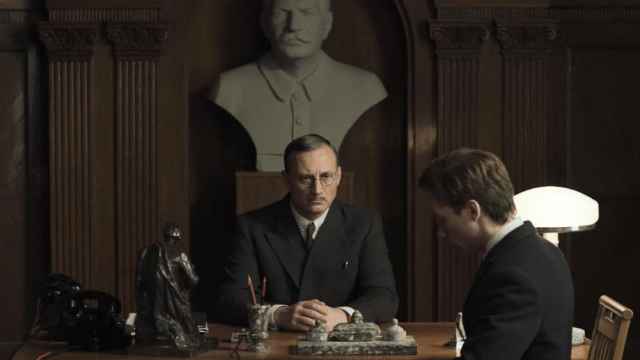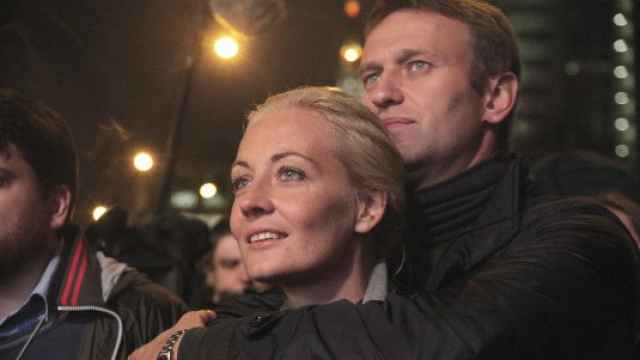I was hanging around the Podmoskovye radio station last week waiting to go on air with my friend and longtime partner Pavel Podkladov. We co-host a monthly show about American music, and this time I was gearing up to listen to, and talk about gospel, specifically that of Mahalia Jackson, Sister Rosetta Tharpe, the Staple Singers and a couple of others.
I had a few minutes to kill before air time and I started looking through the station's large library of old reel-to-reel tapes. I was astonished to discover sound recordings of old theater productions, classical concerts and poets such as Arseny Tarkovsky and Andrei Voznesensky reading their own works.
I jumped at Pavel when he came into the room. "We've got to digitalize these things!" I said. "This stuff is going to crumble and be lost!"
Pavel sadly pointed to an ancient reel-to-reel tape player that looked as if it was made in the 1950s. "Do you see any USB ports on that?" he asked.
The next day, however, I received an email from Pavel with a link to one of the coolest sites I have come across in recent times. Listed as Stihophone.ru, or the Virtual Theater of Poetry, this site offers mp3 recordings of poets reading themselves and actors reading poets. The selection is relatively small &mdash it features just 48 Russians and two foreigners &mdash but what a treasure trove!
Here you can listen to Anna Akhmatova, Alexander Blok, Nikolai Gumilyov, Sergei Yesenin, Osip Mandelshtam, Maximilian Voloshin, Vladimir Mayakovsky and Arseny Tarkovsky reading their own work.
Much of it, especially the older recordings, must battle its way to our ears through "the noise of time," if I may be so bold as to borrow the title from a collection of Mandelshtam's prose.
Blok, reading "On Valor, On Exploits, On Glory," is virtually impossible to decipher unless you follow along with text in hand. The white noise accompanying his performance is as cruel as a St. Petersburg ice storm in January. But the voice, with all its inflections and musical qualities, is readily discernable. It is an astonishing moment to realize that you are in the presence of the actual voice of one of the great Russian writers, who died in Leningrad in 1921.
Even if you don't read Russian, you can hear Blok by going here, then clicking on "MP3."
Akhmatova, reading from her famous poems "Requiem" and "Poem Without a Hero," among many others, is another revelation. She has a tired, knowing voice that sounds as if she is sitting in your living room and reading for you and you alone. Her sighs and pauses are almost as expressive as her famous words. The Akhmatova page can be found here.
Joseph Brodsky is well represented with 76 readings. The last two in the list, incidentally, are of Brodsky reading in English &mdash "Odysseus to Telemachus" and an excerpt from "Roman Elegies." It is a matter of taste, of course, but I find the poet's legendary prowess as a reader significantly diminished in English. The pulsing, chanting voice he used when reading his work in Russian can never be forgotten by anyone fortunate enough to have experienced it, as I did one afternoon at the Boston Public Library in the mid-1980s.
Brodsky and Akhmatova, incidentally, appear to be the site's most popular authors. Brodsky's poems have been downloaded some 74,000 times, while Akhmatova's readings have been downloaded nearly 60,000 times. That's not too shabby even in the YouTube age.
Aside from poets, there are recordings of numerous Russian actors. Perhaps the most unexpected of them is Maria Yermolova, the grand diva of the Maly Theater from the 1870s to her death in 1928. Here she recites one of her monologues from a production of Friedrich Schiller's "Mary Stuart."
Most of the actors included, however &mdash Vasily Kachalov and Igor Ilyinsky from the early 20th century; Mikhail Kozakov, Svetlana Kryuchkova and Innokenty Smoktunovsky from the end of the century &mdash provide readings of popular poems.
One particularly worth listening to is Tatyana Doronina performing Marina Tsvetayeva's "Your Tender Mouth &mdash Sheer Kisses." It is a startling and highly successful match &mdash the actress famed for her breathy, velvety voice and the poet renowned for her craggy, muscular verse.
I cannot fail to share how surprised I was to hear the voice of Boris Pasternak. He almost sounds disinterested as he runs through renditions of such poems as "Night," "Wedding," "Meeting," "Wind" and others. His nasal, diffidently inflected voice is the exact opposite of Brodsky's thundering performances.
For good measure, the site features two poems read by French poet Guillaume Apollinaire and one by English poet Dylan Thomas &mdash a clear and forceful version of "Do Not Go Gentle Into That Good Night."
What a wonder to find that these historic performances have abided by Thomas' plea &mdash and can now be accessed with a few clicks of a mouse.
A Message from The Moscow Times:
Dear readers,
We are facing unprecedented challenges. Russia's Prosecutor General's Office has designated The Moscow Times as an "undesirable" organization, criminalizing our work and putting our staff at risk of prosecution. This follows our earlier unjust labeling as a "foreign agent."
These actions are direct attempts to silence independent journalism in Russia. The authorities claim our work "discredits the decisions of the Russian leadership." We see things differently: we strive to provide accurate, unbiased reporting on Russia.
We, the journalists of The Moscow Times, refuse to be silenced. But to continue our work, we need your help.
Your support, no matter how small, makes a world of difference. If you can, please support us monthly starting from just $2. It's quick to set up, and every contribution makes a significant impact.
By supporting The Moscow Times, you're defending open, independent journalism in the face of repression. Thank you for standing with us.
Remind me later.






